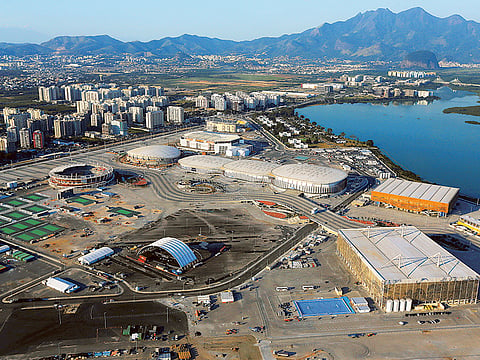Rio Olympic village a self-contained city in itself
Almost 18,000 athletes and officials are expected to check into the sprawling community with 31 high-rise buildings

Rio de Janeiro: It is called a village but a city might be a more fitting name. Almost 18,000 athletes and officials will call Rio de Janeiro’s Olympic village home during the mega event in August and the Paralympic Games in September.
Rio 2016 organisers say it will be the largest number of residents ever housed at an Olympic village, reports Xinhua.
In addition, some 13,000 staff and volunteers will work around the clock to attend to every beck and call of the city’s distinguished guests.
Located in Barra da Tijuca, next to Olympic Park in Rio’s southwest, the Olympic village will comprise 31 high-rise buildings and 3,604 apartments.
It will also feature a shopping centre, banks, medical clinic, gymnasium, post office, beauty salon and shops selling licensed products.
A 200,000 square-metre recreation zone for athletes will boast a lounge area, games room, green areas, a bicycle track and swimming pools.
A 24-hour bus service will also circulate within the village grounds, stopping at every condominium.
The restaurant will be big enough to house a Boeing 747 jumbo jet and will serve an estimated 60,000 meals a day.
According to Olympic village director Mario Cilenti, construction work at the complex has been completed and 70 per cent of the apartments have been furnished.
By the middle of July, the village condominiums will boast some 19,000 beds, 19,650 wardrobes, 11,152 air conditioners, 120,580 towels, 70,200 sheets and 19,000 quilts.
A novelty will be the absence of refrigerators in the apartments. Instead all buildings have been fitted with machines that dispense free cold drinks.
Each apartment block will also feature an ice machine, TV room, computer and printing services, and 24-hour reception with concierge.
“We’ve tried to cover all bases,” Cilenti told the Globo newspaper on Sunday. “It may seem like nonsense but the showers, for example, are a little taller. When we open the village doors, the athletes will begin to tell the world everything via social media. We want to make the best possible impression.”
The village will undergo health and safety inspections before its scheduled opening on July 18. The first athletes are due to arrive six days later.
According to Cilenti, “small adjustments” will be made to accommodate Paralympic athletes, who will start arriving on August 28.
He added that the staff and volunteers would be the village’s most important asset during the Games.
“The big difference with Rio, apart from the city’s beauty, is the warmth of the people,” Cilenti said. “That is what will make the experience unique and something that athletes are not going to forget.”

